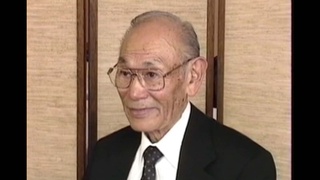Interviews
Feeling at peace with himself
I feel so fulfilled with what I’ve been able to do and experience in life that I’m totally at peace with myself, for what I’ve done. And if you’d ask me, or anyone, would you do anything different in your life? Absolutely not. Including war experiences, including everything else, if I had a chance to live it over again I’d do the same thing.
442nd Regimental Combat Team
armed forces
military
retired military personnel
United States Army
veterans
World War II
Date: January 3, 2015
Location: California, US
Interviewer: Lily Anne Y. Welty Tamai
Contributed by: Watase Media Arts Center, Japanese American National Museum







